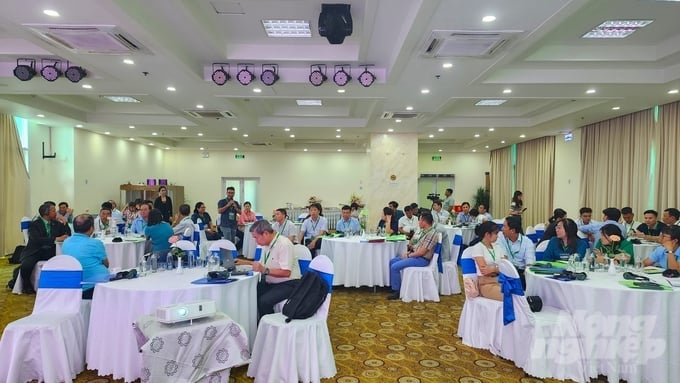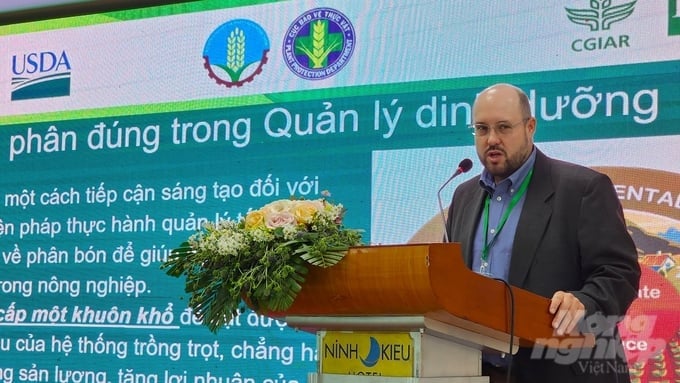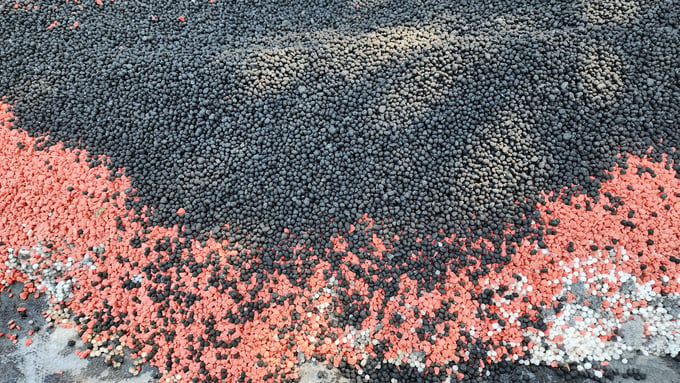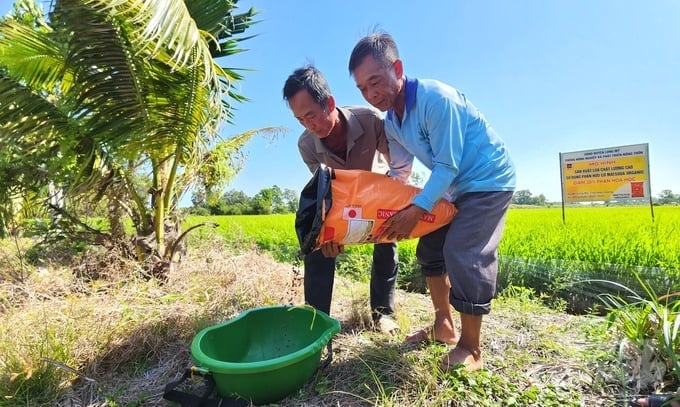November 27, 2025 | 21:14 GMT +7
November 27, 2025 | 21:14 GMT +7
Hotline: 0913.378.918
November 27, 2025 | 21:14 GMT +7
Hotline: 0913.378.918

The training course brought together 45 delegates from local agencies, organizations and units. Photo: Kim Anh.
The Plant Protection Department, under the Ministry of Agriculture and Rural Development, partnered with the International Rice Research Institute (IRRI) to host a training course for trainers in Can Tho City. The course focused on nutrient management and strategies to improve the efficiency of fertilizer use and reduce emissions.
The training course convened 45 delegates from various organizations, including Plant Protection Sub-Departments, Agricultural Service Centers, Agricultural Extension Centers, cooperatives, fertilizer production enterprises, research institutes, and universities. These delegates represented six project provinces and cities: Thai Binh, Nam Dinh, Hai Duong, Soc Trang, Dong Thap, and Can Tho City.
This training program is the inaugural initiative of the Proper Fertilizer Use Project, which is financially supported by the United States Department of Agriculture (USDA). The program's objective is to impart essential information on the correct use of fertilizers, national technical standards for fertilizer quality, enhancing the efficiency of nutrient utilization in rice farming in Vietnam, and region-specific nutrient management techniques.

Mr. Casey Allen, representative of the US Department of Agriculture, introduced the correct approach to fertilization and resource management. Photo: Kim Anh.
In addition, participants will receive information on organic fertilizers, next-generation fertilizers, and potential alternatives to chemical fertilizers in order to mitigate greenhouse gas emissions. The implementation of mechanized precision farming and integrated manure burying techniques will be discussed in order to improve the efficiency of fertilizer usage. The process involves the integration of mechanization and biological treatment to convert straw into organic fertilizer.
The training course effectively imparts specialized knowledge and procedures regarding the proper application of fertilizers in agricultural practices to farmers.
According to Mr. Casey Allen, who represents the USDA, the 4R nutrient stewardship is a cutting-edge method for managing fertilizer in agriculture to promote sustainability.
The 4R idea include selecting the appropriate fertilizer type for the specific needs of the crops, administering the correct amount of fertilizer, timing the nutrient delivery to align with the crops' requirements, and positioning the nutrients in the optimal location to ensure that crops can effectively absorb them.
At present, optimizing nutrient management is a profitable business strategy for tackling issues associated with volatile fertilizer costs and other inputs. Additionally, it aids in enhancing crop yield and preserving sustainable habitats.

4 Right Nutrient Management is an innovative approach to fertilizer management practices to achieve sustainable agriculture. Photo: Kim Anh.
Furthermore, the implementation of appropriate fertilizer application techniques, in conjunction with the utilization of the 4R approach in nutrient management, will assist farmers in adopting more effective methods of fertilizer usage. This presents a chance to offer technical assistance and knowledge to farmers in order to promote environmentally friendly, efficient, and cost-effective harvesting methods. This will lead to better national food security, lower greenhouse gas emissions, and overall improved sustainability for agricultural producers.
The Right Fertilizer Use Project was officially established by the Ministry of Agriculture and Rural Development, in conjunction with the US Department of Agriculture. This initiative is a component of the Global Fertilizer Challenge Program, which is administered by the United States Department of State.
The project will be carried out in Vietnam for a duration of 4 years, with a projected budget of $4.4 million USD. The Plant Protection Department will take the lead in overseeing the project, while its execution will be handled by IRRI.
The Fertilizer Right Project comprises three components. The initial component is dedicated to the development of technologies and instruments that enhance the effectiveness of fertilizer utilization in the cultivation of rice. The second component seeks to improve the communication abilities of stakeholders in effectively applying fertilizer to rice fields. The third component entails the surveillance and assessment of project execution.

The Right Fertilizer Use Project aims to improve fertilizer use efficiency, increase farmers' income, and reduce greenhouse gas emissions in rice farming. Photo: Kim Anh.
Throughout the 4-year project (2024 - 2027), farmers in the project areas will receive technical assistance from experts from the US Department of Agriculture, IRRI, and Vietnamese scientists. This support will enable them to utilize advanced techniques, cutting-edge technologies, and precision agriculture practices to maximize the efficiency of their inputs.
Translated by Linh Linh

(VAN) According to Mr. Vo Minh Thanh, Director of the Tay Ninh Department of Agriculture and Environment, Resolution 57 has created a new development pathway for the locality, shifting from traditional toward modern agriculture.
/2025/11/26/4909-2-154329_878.jpg)
(VAN) Pearl grouper farming in HDPE cages not only delivers economic efficiency but also contributes to protecting the environment, creating jobs, and promoting marine-based experiential tourism.

(VAN) The model of making a living under the forest canopy through the agroforestry system in Van Son commune, Bac Ninh province, is expected to generate an annual income of approximately VND 30 million/ha.

(VAN) Many enterprises in Can Tho are harnessing natural energy and reducing greenhouse gas emissions in their production processes, thereby contributing to the promotion of a sustainable green transition.
/2025/11/24/3536-2-112800_176.jpg)
(VAN) Dong Nai now has tens of thousands of hectares of forests certified for sustainable management, and this area will continue to be expanded in the coming period.

(VAN) Vinh Ha hamlet (Dai Xuyen commune, Hanoi) is shifting away from small-scale farming as households adopt bioscurity into their breeder chicken models.

(VAN) Heavy rains make aquatic species more vulnerable to disease. Proactive water management and high-tech systems help farmers prevent outbreaks and protect yields.